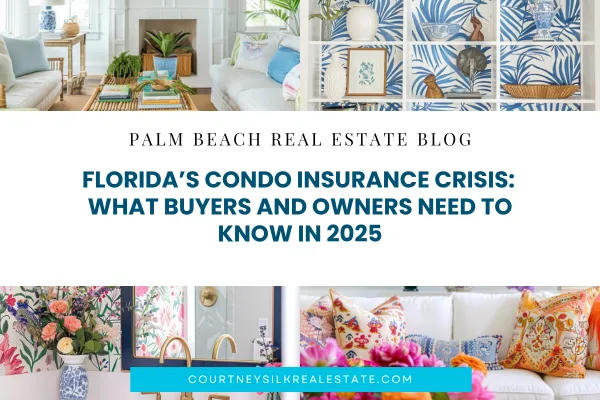
Floridas Condo Insurance Crisis
Florida’s Condo Insurance Crisis: What Buyers and Owners Need to Know in 2025
Florida’s condo market is facing a mounting challenge—one that’s quietly reshaping the buying, selling, and refinancing landscape across the state. For prospective homebuyers and current condo owners in Palm Beach County and throughout South Florida, new developments in insurance requirements and financing limitations are raising critical concerns.
Here’s what’s happening—and what it means for you.
The Refinancing Roadblock
Dave Mayers, a Jupiter condo owner, recently discovered just how serious this issue has become. Despite his strong credit and a favorable refinancing offer that could have saved him $647 a month, lenders denied his application. The reason? His condo association lacked sufficient insurance coverage, specifically not meeting Fannie Mae’s requirement for full replacement value coverage.
This situation isn’t unique. In fact, the number of Florida condo associations blacklisted by Fannie Mae has more than tripled over the last two years—often due to inadequate insurance. That blacklist restricts access to federally backed loans and refinancing for units in those buildings, putting both property values and financial stability at risk.
What’s Behind the Insurance Crisis?
Following the Surfside condo collapse in 2021, Florida lawmakers passed structural integrity regulations to prevent similar tragedies. As a result, insurance companies pulled back or raised premiums significantly, citing the high risk associated with aging buildings and increased scrutiny.
Many condo associations, particularly older low-rise and high-rise communities, have struggled to:
• Secure coverage at all
• Afford full replacement value insurance
• Comply with both state law and lender expectations
Even as Florida’s insurance market has shown signs of recovery in recent months, coverage that meets Fannie Mae’s strict requirements is often unavailable or prohibitively expensive, especially for buildings with older roofs, outdated infrastructure, or deferred maintenance.
The Legislative Gap
In an effort to help associations cope, Florida lawmakers passed a bill in 2025 to give condo boards more flexibility in obtaining financing and selecting adequate insurance coverage based on “insurable value” rather than full replacement value.
While this provides some relief, it doesn’t align with Fannie Mae or Freddie Mac lending standards, meaning the blacklisting problem could persist unless federal agencies adjust their criteria—or associations find ways to fully insure at today’s prices.
Why This Matters for Florida Buyers
If you’re considering buying a condo in Palm Beach County or elsewhere in Florida, here’s what this means for you:
1. Financing May Be Limited:
If the building is on Fannie Mae’s ineligible list, getting a mortgage may require a portfolio loan or private financing, which usually comes with higher rates and stricter terms.
2. Insurance Gaps Affect Property Value:
Properties that are difficult to finance are harder to sell, which may depress values or increase the time it takes to sell your unit.
3. Increased Financial Pressure on Owners:
Even if you’re paying cash, you may face rising HOA fees or special assessments as associations scramble to meet reserve funding and structural repair mandates.
4. Refinancing Risks:
Like Dave Mayers, you may find yourself unable to refinance your mortgage—even if interest rates drop—due to your association’s insurance status.
What Should Buyers and Owners Do?
If you’re shopping for a condo—or already own one—here are a few key steps to take:
• Ask the right questions before making an offer:
• Is the building eligible for Fannie Mae or Freddie Mac financing?
• Does the HOA carry full replacement value insurance?
• Has the building completed its structural integrity reserve study?
• Work with a local real estate expert who knows the market:
The nuances of South Florida’s condo landscape are changing rapidly. Partnering with an agent who understands these complexities is crucial to protecting your investment.
• Consult your lender and insurance provider early in the process:
Before making an offer or applying to refinance, confirm that the building meets underwriting guidelines and find out how insurance limitations might affect your options.
Final Thoughts
Florida’s condo insurance crisis isn’t just a regulatory issue—it’s a financial and lifestyle challenge impacting tens of thousands of residents. And while legislative changes may offer partial relief, the gap between state policy and federal lending standards remains a major hurdle.
For buyers, it’s more important than ever to go beyond location and price. Pay close attention to a building’s insurance health, financial stability, and reserve planning. These are no longer back-page details—they’re dealbreakers.
📩 If you’re considering buying or selling a condo in Palm Beach County, I can help you navigate these challenges and understand what’s happening behind the scenes. Let’s make sure your next move is a smart and secure one.
